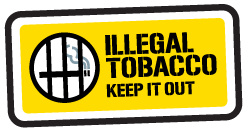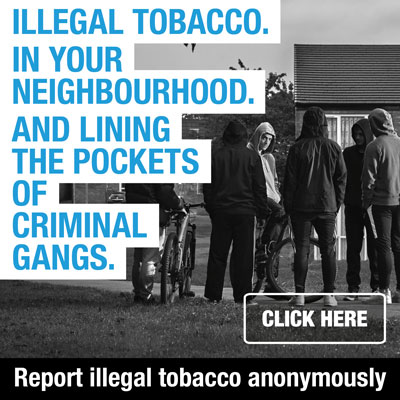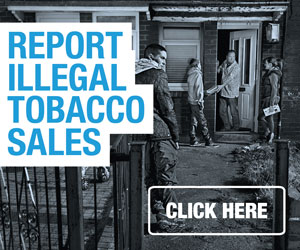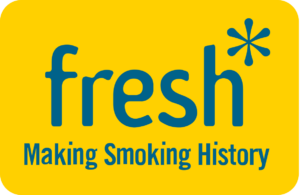Get some answers
You might think that having illegal cigarettes knocking around your area is nothing to worry about but the trade in illegal tobacco has serious consequences for health and crime. Here are answers to the common questions people ask:
Questions
- What is illegal tobacco?
- Is legal tobacco less toxic?
- If I give information will anything be done?
- How does it affect me if I don't smoke?
- Where is illegal tobacco being sold?
- How can I prevent criminals from taking advantage of vulnerable people?
- Should I be worried about illegal vapes?
- Aren't sellers just trying to make a few quid?
- Why would my son/daughter buy illegal tobacco?
- I don’t believe my dealer or shops would sell illegal tobacco to kids
- Are illegal cigarettes a fire risk?
- Why are you trying to stop illegal tobacco being sold?
- Is the tobacco industry trying to stop this?
- Will I lose my job if I get caught selling illegal tobacco?
- If legal tobacco was cheaper, would that mean people wouldn’t need to buy illegal tobacco?
- Who is behind the Keep It Out campaign?
Answers
-
What is illegal tobacco?
People often assume that the cheap tobacco, such as cigarettes, hand-rolling tobacco or products like beedis and shisha, sold locally is duty free – but in fact, illegal tobacco comes in many different forms. It might be:
• Tobacco or cigarettes with no legal market in the UK, often from Eastern Europe – sometimes known as “cheap whites.”
• UK brands which are smuggled into the country and sold without duty being paid.
• Counterfeit/fakes – illegally manufactured and made to look like recognised brands -
Is legal tobacco less toxic?
All tobacco kills. Whether they are bought legitimately or illegally, all tobacco products contain over 5,000 chemicals, at least 60 of which are known to cause cancer. All tobacco kills up to two in three lifelong smokers.
-
If I give information will anything be done?
You can give information anonymously with full confidence it will be taken seriously. Information given by people like you helps Trading Standards and other enforcement partners to take more illegal tobacco off the streets.
-
How does it affect me if I don't smoke?
Illegal tobacco is an issue that affects everyone who doesn’t want their children or grandchildren to start smoking, or who wants a crime-free neighbourhood. The supply is linked to criminals who are involved in other criminal activity.
-
Where is illegal tobacco being sold?
Illegal tobacco is supplied to a range of people in different locations. It is then sold in our communities from private houses, sometimes known as tab houses , ‘under the counter’ in shops and pubs and clubs, through social media and even on the street or by ice-cream vans.
-
How can I prevent criminals from taking advantage of vulnerable people?
Criminal gangs are known to target vulnerable, cash-strapped families and individuals by paying them to travel abroad and smuggle illegal tobacco back into the country. Illegal tobacco can also be linked to loan sharking. If you think you know someone who is being taken advantage of in this way, you can report it anonymously here or directly to Trading Standards.
-
Should I be worried about illegal vapes?
Although illegal tobacco and illegal vapes may often be found together during raids and other enforcement activity, electronic cigarettes are not tobacco.
All tobacco will kill and cause cancer, whether its legal or illegal. We now know tobacco will kill up to 2 in 3 lifelong smokers early – which is why medical advice here in the UK is to switch to switch to legal vapes. It is also worth remembering that vapes can be illegal for a number of reason – and for vapes, illegal doesn’t always mean dangerous.
The advice is simple: if you don’t smoke, don’t vape. But if you smoke switch to vaping instead.
-
Aren't sellers just trying to make a few quid?
You might think that your local seller can be trusted, and they might tell you that they don’t sell to children. However, illegal tobacco has strong links to both low-level local criminals and large-scale organised crime groups from abroad. Those gangs see UK smokers as a target to make money. That means that people buying illegal tobacco – either for their own use or to sell on – are lining criminals’ pockets and funding drugs, loan sharking, alcohol smuggling and money laundering. It also brings criminals into local neighbourhoods to supply local sellers.
-
Why would my son/daughter buy illegal tobacco?
Nobody likes to think about their children trying smoking, and fewer children are starting to smoke nowadays than ever before. However, we know that 2 in 3 kids who try smoking go on to smoke long term. Surveys show that illegal tobacco is an easy source for children because it’s cheap and because, unlike most responsible retailers, the people selling it don’t mind selling to children. Dealers might tell their customers that they don’t sell to children, but the truth is that many do.
-
I don’t believe my dealer or shops would sell illegal tobacco to kids
Most retailers are honest and would not dream of selling illegal tobacco, or selling tobacco to kids. However a dishonest minority are prepared to do both. There are regular reports from Trading Standards of kids in school uniform buying it and shops or dealers selling to them. Many young people who buy illegal tobacco do so from local shops.
-
Are illegal cigarettes a fire risk?
Smoking any type of tobacco – legal or illegal – is a fire risk. More people die in the UK in fires caused by smoking than any other cause. Legal cigarettes will be made with a feature that means they should self-extinguish when left to burn, but even better would be not to smoke at all.
-
Why are you trying to stop illegal tobacco being sold?
Illegal tobacco makes it easier for children to get hold of cigarettes and to start smoking. And cheap tobacco encourages smokers to keep smoking and to smoke more, and can break down their willpower to quit. We are working to prevent the devastating harm tobacco causes and make smoking history.
-
Is the tobacco industry trying to stop this?
Tobacco companies have facilitated the smuggling of their own cigarettes and roll your own tobacco for decades and have received significant fines for doing so. The Tobacco Tactics website is a good source of information on the tobacco industry role in the illicit trade: Tobacco Smuggling – TobaccoTactics
-
Will I lose my job if I get caught selling illegal tobacco?
Selling illegal tobacco at work could put your job at risk. Trading Standards can take action against an employer if it is suspected that they are directly involved and profiting from the sale of illegal tobacco. If the employer is in charge of a licensed premises, he or she may be committing a criminal offence if they allow illegal products to be kept on site. Pubs and shops that sell alcohol can also lose their alcohol licence if people sell illegal tobacco on their premises.
-
If legal tobacco was cheaper, would that mean people wouldn’t need to buy illegal tobacco?
Price isn’t the only driver of illegal trade: other issues play a role too, like government corruption and weak enforcement strategies. The illegal tobacco market is often bigger in countries where tobacco is cheaper. The UK has an effective anti-illicit tobacco strategy and, as such, the market share has fallen at the same time as prices have increased and other tobacco control measures have been introduced. Increasing the price of tobacco is the best policy to help reduce smoking rates, especially among younger people.
-
Who is behind the Keep It Out campaign?
Keep it Out is a campaign managed in the North East of England by Fresh. Fresh is the dedicated tobacco programme for the North East of England, hosted by County Durham and Darlington NHS Foundation Trust and commissioned by North East local authorities and the North East and North Cumbria Integrated Care Board with the aim of helping smokers to stop, preventing young people from starting to smoke and protecting people from tobacco-related harm. In Greater Manchester, the campaign is managed by Greater Manchester Health and Social Care Partnership as part of its illicit tobacco programme, which you can read more about in the Greater Manchester Making Smoking History strategy. The Partnership is made up of local NHS organisations and councils, as well as people from NHS England and NHS Improvement, our emergency services, the voluntary sector, Healthwatch and others including the mayor of Greater Manchester.




